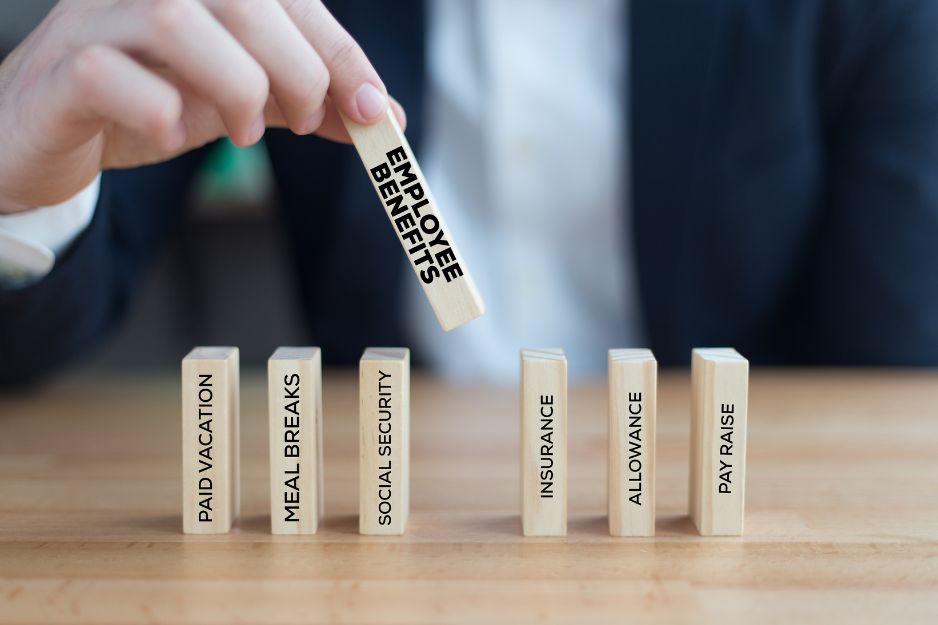
Fringe benefits tax (FBT) is a tax paid on benefits that an employer provides to their employees in addition to their salary.
The following items are unlikely to be subject to FBT: mobile phones, laptops, tablets, portable printers, protective clothing, tools of trade etc, or minor and infrequent benefits that are less than $300 in value.
Download: Entertaining, Meals & FBT – Tips & Traps factsheet.
Portable electronic devices
Portable electronic devices that are mainly used for work purposes are exempt from fringe benefits tax (FBT).
The exemption applies to one item per FBT year for items with a substantially identical function (unless it is a replacement item).
However, small businesses can provide employees with more than one work-related portable electronic device in an FBT year – even if they have substantially identical functions. A small business is a business with an aggregated turnover of less than $50 million in an income year that starts or ends in the relevant FBT year.
A portable electronic device is a device that:
- is easily portable and designed for use away from an office environment
- is small and light
- can operate without an external power supply
- is designed as a complete unit.
Portable electronic devices include:
- Mobile phones
- Laptop and tablet computers
- Portable printers
- Calculators
- Portable global positioning system (GPS) navigation receivers.
Software, protective clothing, tools of trade
The following work-related items are exempt from FBT where they are mainly used for work purposes:
- Computer software
- Protective clothing
- Briefcases
- Tools of trade.
There is a limit of one item per employee in an FBT year for items that are basically the same, unless it is a replacement item.
Are there any special COVID-19 exemptions for FBT?
You may provide your employees benefits you do not usually provide because of COVID-19. This includes paying for items that allow your employees to work from home.
Read more: Tax deductions for working from home 2023
You may have provided employees with items to allow them to work from home (or from another location) due to COVID-19. Some items will usually be exempt from FBT if they are primarily used by your employees for work. The items include:
- Laptops
- Portable printers
- Other electronic devices.
Also, the minor benefits exemption or the otherwise deductible rule may apply if you:
- allow your employee to use a monitor, mouse or keyboard they otherwise use in the workplace, or
- provide them with stationery or computer consumables or pay for their phone and internet access.
Protective Equipment
You may need to pay FBT on items you give your employees to help protect them from contracting COVID-19 while at work. These include:
- Gloves
- Masks
- Sanitisers
- Anti-bacterial spray.
However, these benefits are exempt from FBT under the emergency assistance exemption if you provide them to employees:
- who have physical contact with – or are in close proximity to – customers or clients while carrying out their duties, or
- are involved in cleaning premises.
Examples of this type of work include:
- Medical (such as doctors, nurses, dentists and allied health workers)
- Cleaning
- Airline
- Hairdressing and beautician
- Retail, café and restaurant.
If your employees’ specific employment duties are not of the kind described above, the minor benefits exemption may apply if you provide an employee with minor, infrequent and irregular benefits under $300.
Motor Vehicles during COVID-19 restrictions
You provide a car fringe benefit where a car is applied for your employee’s private use or available for your employee’s private use.
During a period of COVID-19 restrictions, a car that you have provided to your employee is not taken to be available for your employee’s private use if all the following apply:
- The car is returned to your business premises
- Your employee cannot gain access to the car
- Your employee has relinquished an entitlement to use your car for private purposes.
You may have been garaging work cars at your employees’ homes due to COVID-19. You may not have an FBT liability depending on:
- The type of vehicle
- How often the car is driven, and
- The calculation method you choose for car benefits.
Electric cars exemption
From 1 July 2022 employers do not pay FBT on eligible electric cars and associated car expenses.
Eligibility
You do not pay FBT if you provide private use of an electric car that meets all the following conditions:
- The car is a zero or low emissions vehicle
- The first time the car is both held and used is on or after 1 July 2022
- The car is used by a current employee or their associates (such as family members)
- Luxury car tax (LCT) has never been payable on the importation or sale of the car.
Benefits provided under a salary packaging arrangement are included in the exemption.
The government will complete a review into this exemption by mid-2027 to consider electric car take-up. We will provide an update when this review begins.
Zero or low emissions vehicle
A vehicle is a zero or low emissions vehicle if it satisfies both of these conditions:
- It is a:
- Battery electric vehicle
- Hydrogen fuel cell electric vehicle, or
- Plug-in hybrid electric vehicle.
- It is a car designed to carry a load of less than 1 tonne and fewer than 9 passengers (including the driver).
Motorcycles and scooters are not cars for FBT purposes and do not qualify for the exemption, even if they are electric.
Associated car expenses
The following car expenses are exempt from FBT if they are provided for an eligible electric car:
- Registration
- Insurance
- Repairs or maintenance
- Fuel (including electricity to charge and run electric cars).
You may be able to reduce the FBT on any items that aren’t exempt car expenses, if the expenditure would have been deductible to the employee had they incurred it themselves. This is called the otherwise deductible rule.
Do you provide car parking for employees?
Car parking benefits are exempt from FBT where the benefits are provided:
- by employers who meet the conditions of the small business car parking benefits exemption (see below);
- by certain research, education, religious and charitable institutions; and
- for employees with a disability (irrespective of the type of employer).
The small business car parking benefits exemption applies if the following conditions are satisfied:
- the parking is not provided in a commercial car park; and
- for the last income year before the relevant FBT year, either the employer’s gross total income was less than $50 million or their turnover was less than $50 million.
This exemption is not available to listed public companies, subsidiaries of listed public companies and government bodies.
As from 1 April 2022, the ATO has updated guidance on what qualifies as a commercial car parking station. Talk to our KMT tax adviser if you provide car parking for employees as you may be affected.
Ways you can reduce your FBT liability
Here are some ways in which you can reduce your FBT liability:
- Replace your fringe benefits with cash salary;
- Provide benefits that your employees would be entitled to claim as an income tax deduction if they had to pay for the benefits themselves;
- Look at providing benefits that are exempt from FBT; and
- Use employee contributions, for example, an employee paying for some of the operating costs of car fringe benefit such as fuel that you don’t reimburse them for. You need to be aware that employee contributions will be deemed assessable income to you and subject to GST.
Read more: What you need to know about FBT
Contact KMT accountants now if you need advice or assistance with FBT Return lodgement!
This is general advice only and does not take into account your financial circumstances, needs and objectives. Before making any decision based on this document, you should assess your own circumstances or seek tax advice from a qualified accountant at KMT Partners. Information is current at the date of issue and may change.


